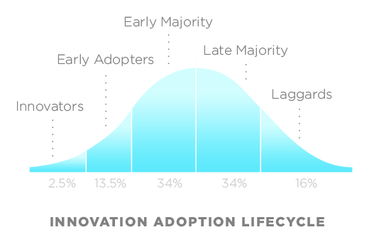

This article needs additional citations for verification. Please help improve this articlebyadding citations to reliable sources. Unsourced material may be challenged and removed.
Find sources: "Early adopter" – news · newspapers · books · scholar · JSTOR (May 2024) (Learn how and when to remove this message) |
Anearly adopterorlighthouse customer is an early customer of a given company, product, or technology. The term originates from Everett M. Rogers' Diffusion of Innovations (1962).[1]
Typically, early adopters are customers who, in addition to using the vendor's product or technology, also provide considerable and candid feedback to help the vendor refine its future product releases, as well as the associated means of distribution, service, and support.[according to whom?] Early adoption could also be referred to as a form of testing in the early stages of a project.

The relationship is synergistic. The customer receives early (and sometimes unique, or at least uniquely early) access to an advantageous new product or technology. In return, the customer may also serve as a kind of guinea pig.[citation needed]
In exchange for being an early adopter, and thus being exposed to the problems, risks, and annoyances common to early-stage product testing and deployment, the "lighthouse customer" is sometimes given especially attentive vendor assistance and support, even to the point of having personnel at the customer's work site to assist with implementation. The customer is sometimes given preferential pricing, terms, and conditions, although new technology is often very expensive, so the early adopter still often pays quite a lot.[citation needed]
The vendor, on the other hand, benefits from receiving early revenues, and also from a lighthouse customer's endorsement and assistance in further developing the product and its go-to-market mechanisms. Acquiring lighthouse customers is a common step in new product development and implementation. The real-world focus that this type of relationship can bring to a vendor can be extremely valuable.[citation needed]
Early adoption does come with pitfalls: early versions of products may be buggy and/or prone to malfunction. Furthermore, more efficient, and sometimes less expensive, versions of the product usually appear a few months after the initial release (Apple iPhone).[2][3] The trend of new technology costing more at release is often referred to as the "early adopter tax".[4]